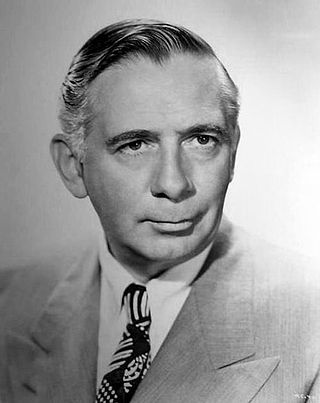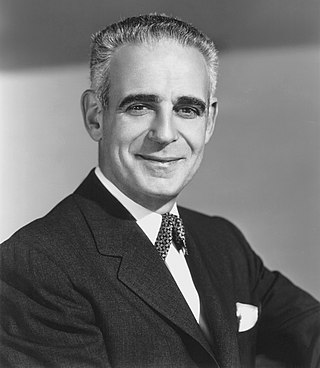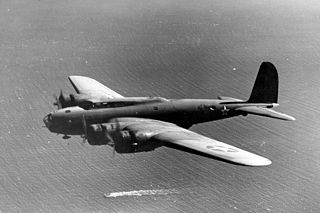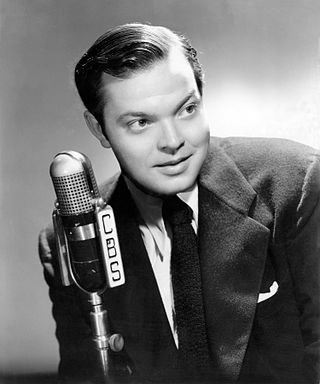
George Orson Welles was an American director, actor, writer, and producer who is remembered for his innovative work in film, radio, and theatre. He is considered to be among the greatest and most influential filmmakers of all time.

"The War of the Worlds" was a Halloween episode of the radio series The Mercury Theatre on the Air directed and narrated by Orson Welles as an adaptation of H. G. Wells's novel The War of the Worlds (1898) that was performed and broadcast live at 8 pm ET on October 30, 1938, over the CBS Radio Network. The episode is infamous for inciting a panic by convincing some members of the listening audience that a Martian invasion was taking place, though the scale of panic is disputed, as the program had relatively few listeners.
CBS Television Quiz is an American game show, running from July 2, 1941, to January 7, 1943, on the CBS television station in New York, WCBW Channel 2. It was the first game show to be broadcast regularly on television. It was an in-house production and broadcast in black-and-white. The host was Gil Fates, with Frances Buss as scorekeeper.

The Mercury Theatre was an independent repertory theatre company founded in New York City in 1937 by Orson Welles and producer John Houseman. The company produced theatrical presentations, radio programs and motion pictures. The Mercury also released promptbooks and phonographic recordings of four Shakespeare works for use in schools.

The March of Time is an American newsreel series sponsored by Time Inc. and shown in movie theaters from 1935 to 1951. It was based on a radio news series broadcast from 1931 to 1945 that was produced by advertising agency Batten, Barton, Durstine & Osborn (BBDO). The "voice" of both series was Westbrook Van Voorhis. Produced and written by Louis de Rochemont and his brother Richard de Rochemont, The March of Time was recognized with an Academy Honorary Award in 1937.

William Bletcher was an American actor. He was known for voice roles for various classic animated characters, most notably Pete in Walt Disney's Mickey Mouse short films and the Big Bad Wolf in Disney's Three Little Pigs.

Ray Bidwell Collins was an American character actor in stock and Broadway theatre, radio, films, and television. With 900 stage roles to his credit, he became one of the most successful actors in the developing field of radio drama. A friend and associate of Orson Welles for many years, Collins went to Hollywood with the Mercury Theatre company and made his feature-film debut in Citizen Kane (1941), as Kane's political rival. Collins appeared in more than 75 films and had one of his best-remembered roles on television, as Los Angeles homicide detective Lieutenant Arthur Tragg in the CBS-TV series Perry Mason.

George Alexander Coulouris was an English film and stage actor.

Paul Stewart was an American character actor, director and producer who worked in theatre, radio, films and television. He frequently portrayed cynical and sinister characters throughout his career.

The Chase and Sanborn Hour is the umbrella title for a series of American comedy and variety radio shows sponsored by Standard Brands' Chase and Sanborn Coffee, usually airing Sundays on NBC from 8 p.m. to 9 p.m. during the years 1929 to 1948.

The American School of the Air was a half-hour educational radio program presented by CBS as a public affairs teaching supplement over an 18-year period during the 1930s and 1940s. CBS followed the lead of the first School of the Air which began in 1929 at Ohio State University.
The War of the Worlds was a radio drama, originally aired by Buffalo, New York radio station WKBW 1520 on October 31, 1968. It was a modernized version of the original radio drama aired by CBS in 1938.
Passport to Adventure, later retitled Passport, was a Canadian movie television series which aired on CBC Television from 1965 to 1967.

Ceiling Unlimited (1942–1944) is a CBS radio series created by Orson Welles and sponsored by the Lockheed-Vega Corporation. The program was conceived to glorify the aviation industry and dramatize its role in World War II.

This is a comprehensive listing of the radio programs made by Orson Welles. Welles was often uncredited for his work, particularly in the years 1934–1937, and he apparently kept no record of his broadcasts.
Radio is what I love most of all. The wonderful excitement of what could happen in live radio, when everything that could go wrong did go wrong. I was making a couple of thousand a week, scampering in ambulances from studio to studio, and committing much of what I made to support the Mercury. I wouldn't want to return to those frenetic 20-hour working day years, but I miss them because they are so irredeemably gone.

The Mercury Theatre on the Air is a radio series of live radio dramas created and hosted by Orson Welles. The weekly hour-long show presented classic literary works performed by Welles's celebrated Mercury Theatre repertory company, with music composed or arranged by Bernard Herrmann. The series began July 11, 1938, as a sustaining program on the CBS Radio network, airing Mondays at 9 pm ET. On September 11, the show moved to Sundays at 8 pm.

The Mercury Summer Theatre of the Air (1946) is a CBS radio drama series produced, directed by and starring Orson Welles. It was a short-lived summer radio series sponsored by Pabst Blue Ribbon, on Friday evenings at 10 p.m. ET lasting 15 episodes. It harked back to Welles's earlier The Mercury Theatre on the Air (1938) and its successor, The Campbell Playhouse, but was not able to replicate its success. The series offered 30-minute adaptations of classic plays and novels, plus some adaptations of popular motion pictures, whereas the original had offered more depth in its 60-minute running time. Although the Mercury Theatre troupe had disbanded when Welles was fired from RKO studios in 1942 and the Mercury players were dismissed with him, this radio series offered a reunion of many Mercury personnel, including Richard Wilson and composer Bernard Herrmann, as well as familiar actors such as Agnes Moorehead and William Alland.

The Orson Welles Almanac is a 1944 CBS Radio series directed and hosted by Orson Welles. Broadcast live on the Columbia Pacific Network, the 30-minute variety program was heard Wednesdays at 9:30 p.m. ET January 26 – July 19, 1944. The series was sponsored by Mobilgas and Mobiloil. Many of the shows originated from U.S. military camps, where Welles and his repertory company and guests entertained the troops with a reduced version of The Mercury Wonder Show. The performances of the all-star jazz band that Welles brought together for the show were an important force in the revival of traditional New Orleans jazz in the 1940s.

The Baker's Broadcast is the name applied to three old-time radio variety programs in the United States. The first one went on the air October 8, 1933; the third one's last broadcast was June 26, 1938. The name applied to all three apparently was derived from Fleischmann's Yeast, which sponsored all three programs.




















